Vol. 11 レポート アセアン・カフェ「企業と歩むアジア社会と芸術文化支援 ~3年間のASEANプログラムの成果を踏まえて」前半
Vol.11 レポート アセアン・カフェ「企業と歩む、アジア社会と芸術文化支援 ~3年間のASEANプログラムの成果を踏まえて~」~前半~
Report: ASEAN Café In Partnership with Corporations – Art and Cultural Activities -Achievements and future tasks based on the 3-year ASEAN project- -part1-
2015年より協議会で実施している「ASEAN諸国における企業メセナの促進とネットワーク構築に向けた調査・協議」(助成:国際交流基金アジアセンター)。本年は、この3年間交流を深めた各ASEAN文化団体へのインタビュー・コラムや、視察レポートを連載しています。
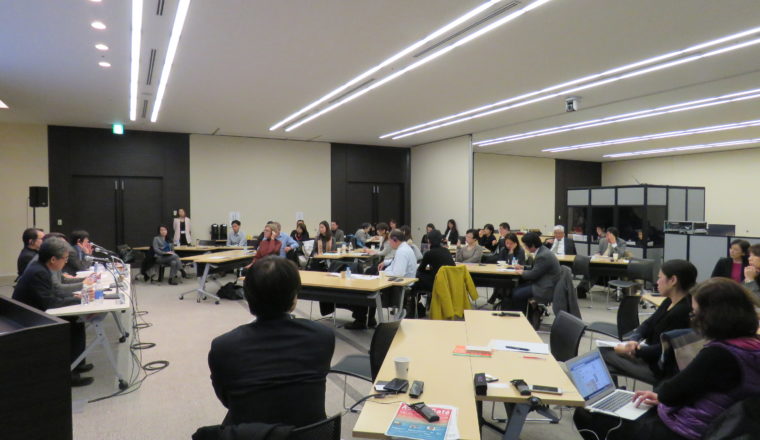
_____________________________________
企業メセナ協議会は2015年より行ってきたASEAN諸国における“企業メセナ”の促進とネットワーク構築プログラムの締めくくりとして、3年間を振り返り、これからのアジア社会における企業と芸術文化支援について話し合うオープンカフェを開催しました。
Association for Corporate Support of the Arts (Kigyo Mecenat Kyogikai: KMK) has been organizing the continuous series of implementing research, mutualexchanges and conferences in collaboration with corporations, foundations, and governments of Malaysia, Indonesia, and Singapore since 2015.
As a conclusion of this 3-year project, KMK held an open discussion ‘ASEAN Café’ to look back over the three years, and to discuss future corporate support for the arts and culture in Asian society.
日時 /Date
2018年2月7日(水)| Wednesday, 7th February 2018
15:00~17:00 [開場14:30] | 15:00-17:00 [Door Open 14:30]
会場 | Venue
損保ジャパン日本興亜日本橋ビル 2F 202会議室 | Conference Room 202, Sompo Japan Nipponkoa Nihombashi Building 2F
東京都中央区日本橋2-2-10 |2-2-10, Nihombashi, Chuo-ku, Tokyo
ゲスト・プレゼンテーション
1.インドネシア | マルコ・クスマウィジャヤ 氏
2.マレーシア | ブライアン・ジョンソン・ロウエ 氏
3. シンガポール | コリン・ゴー 氏
_____________________________________
■プレゼンテーション①:マルコ・クスマウィジャヤ氏(都市研究ルジャックセンター ディレクター/インドネシア)
「多角的プログラムへの多角的助成」と題し、インドネシア各地でのワークショップやアーティストインレジデンスのプログラム、日本人アーティストの受け入れについて事例報告をいただきました。都市研究ルジャックセンターでは、民間企業・団体らによるサポートを得ながら、今後もインドネシア各地での多角的活動支援を行っていく予定です。
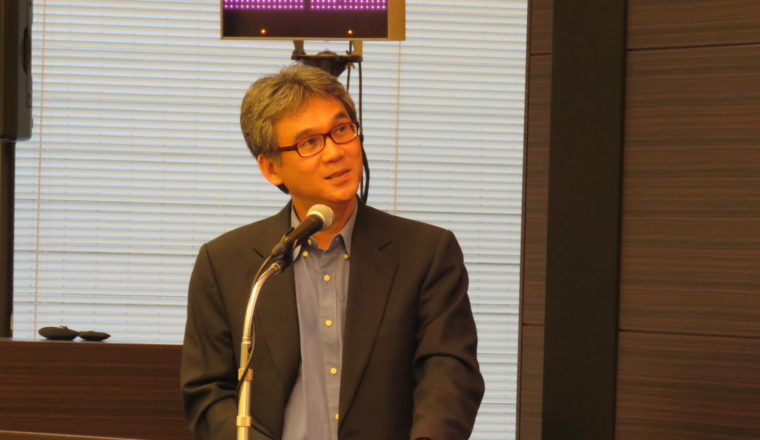
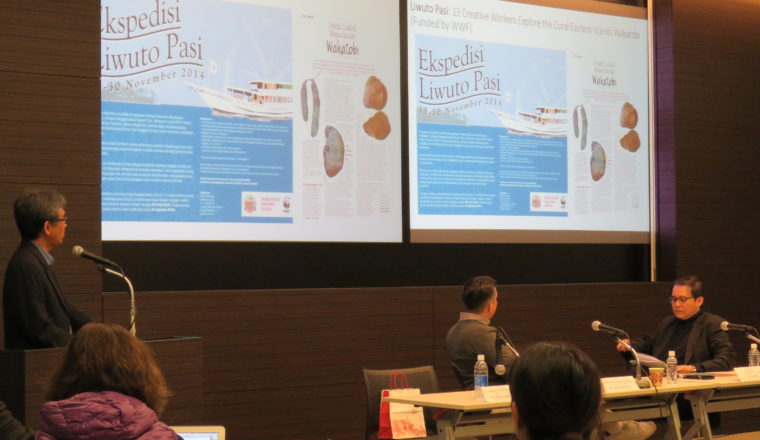
マルコ氏によるルジャックセンターとインドネシア芸術支援のプレゼンテーション
Presentation by Marco about his Rujak Center for Urban Studies and Indonesian support for the arts
■プレゼンテーション②:ブライアン・ジョンソン・ロウエ氏(マイ・パフォーミング・アーツ・エージェンシー 共同設立者・ディレクター/マレーシア)
「変革のとき―マイ・パフォーミング・アーツ・エージェンシーのプロジェクトとその理念」と題し、人々が誰でも舞台芸術を楽しめるようになるための芸術文化エコシステムの構築に向けて、マイパフォーミングアーツがどのような取り組みを行っているかをご紹介いただきました。特にマレーシアでは、本プロジェクトを通じて知った日本の企業メセナを参考に、政府機関・文化経済開発局への働きかけや、「企業による芸術支援のための連合会議」の設立など、大きな前進が見られました。
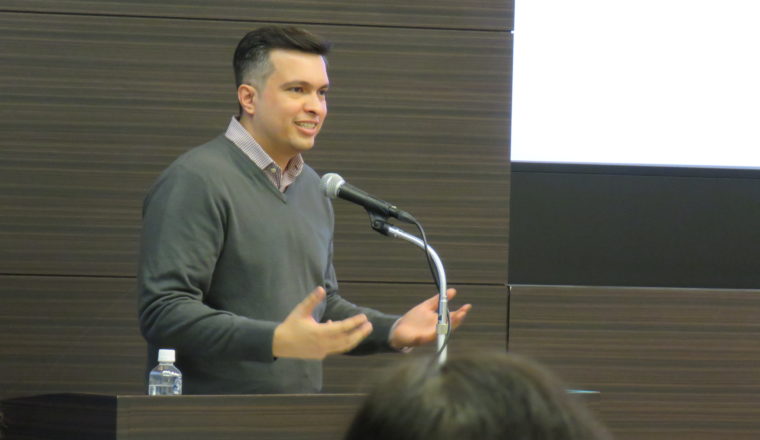
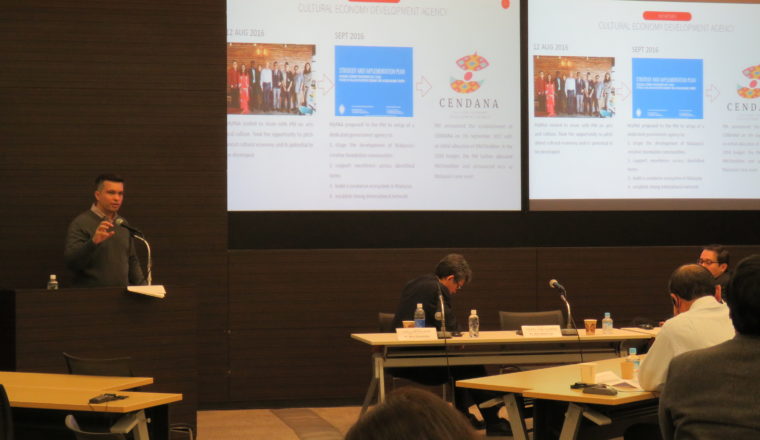
ブライアン氏によるマイ・パフォーミング・アーツ・エージェンシーとマレーシア公民両側の芸術支援のプレゼンテーション
Presentation by Brian about his My Performing Arts Agency and Malaysian public and private support for the arts
■プレゼンテーション③:コリン・ゴー氏(ライスカンパニー 共同設立者・経営責任者、ミレット・ホールディングス 常務理事/シンガポール)
11月のシンガポール視察でも面会したコリン・ゴー氏からは、アートを活性化し、国内全ての人に芸術文化に触れる機会を創出するための投資会社「ミレット・ホールディングス」および芸術支援団体「グローバル・カルチャー・アライアンス」での、新しい文化支援施策の取り組みについてご紹介をいただきました。(詳細は11月の視察レポートをご参照ください。)
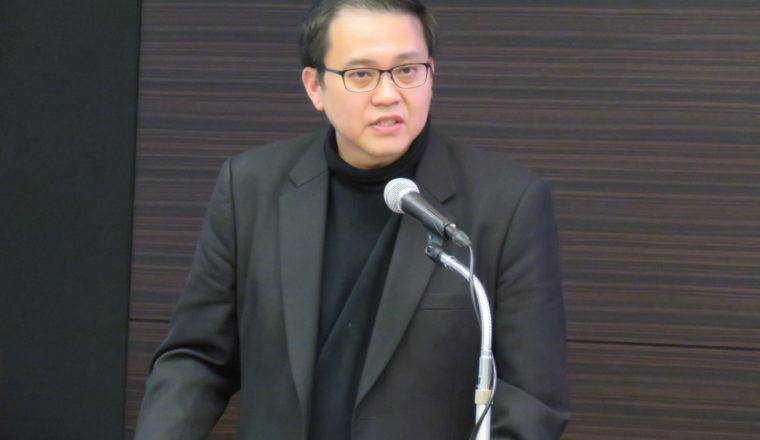
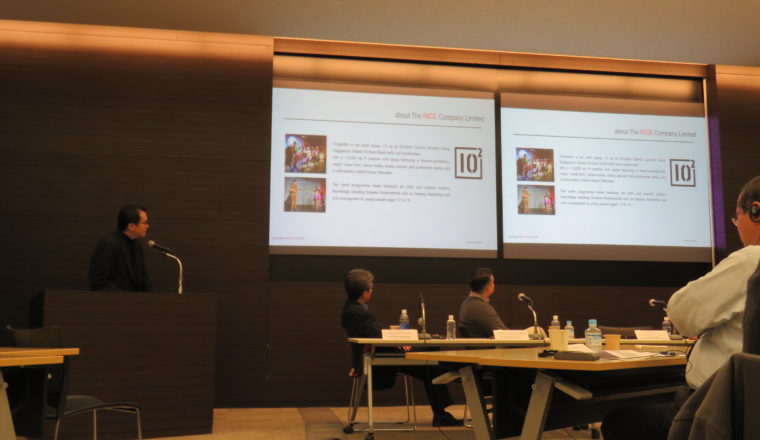
コリン氏によるライス・カンパニーとシンガポール芸術支援のプレゼンテーション
Presentation by Colin about his the RICE Company and Singaporean support for the arts
質疑応答| Q&A
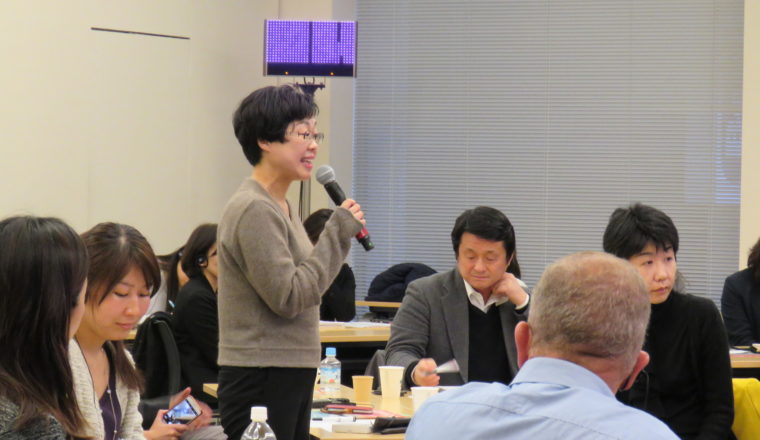
―― 日本でNPOをしています。日本政府は相談は聞いてくれますが、具体的なヒントはいただけません。また政府や企業の助成金に申請すると本体が赤字だと大きな額の助成金は降りません。しかし、赤字だからこそ助成金がほしい。マレーシアやインドネシア政府の理解の違いだったり、政府を巻き込んでやっていくにはどうしたらいいのかアドバイスをいただけると嬉しいです。
Q: I run a NPO in Japan. The Japanese government listens to the consultation, but concrete advice or hints are not available. Also, when you apply for government or corporate grants, if the organization is in the red, you will not receive a large grant. However, because we are in red, we want a grant. Are there any differences in interaction with the governments of Malaysia and Indonesia? Could you give me some advice on how to involve and engage with the government?
ブライアン:マイパは確かにこの6年間政府と共にしごとをしてきました。ただ、違いは私たちが自分たちの力でまずはやってみようと、民間企業として始めたからです。どんなこともまず自分たちでやり、足りない資金は政府だけでなくほかからの資金調達を試みたり、こういったことでコミュニティの人たちから信頼を得てきました。
Brian: Yes, MyPAA has been working with the government for 6 years. The difference is because we decided to become private, to take it upon us to ourselves to do this initiative, bring together other sourcing of funding, community founds trust of MyPAA.
マレーシアの助成制度はとてもシンプルです。政府が助成し、アーティストが助成を受ける。しかし、これが問題でした。終わりがないのです。どのように助成が使われたのか、どのような作品に助成を使ったのか、どんな作品なのか、誰が関わったのか、どこで行われたのか、誰が支払われたのか、すべてが見える化しておらず誰も何も知らないのです。ですから、私たちはまずそのモデルを変えることにしました。そして、民間企業に目を向けてみました。政府の政策として、芸術文化に寄付をした団体や企業は税制優遇を得られるのですが、制度自体があまりにもあいまいで誰も知らなかったことです。どのように申請するのかなどまったくわかりません。アーティストもその事実をしりません。
We realize the way funding in Malaysia as quite simple. The government funds, and artists take it. There is no closure, there is no way to know whether funds were used for work, what work, where, who involved, and who were paid. So we changed the model. So we look at corporates. As a government policy, any organizations and corporations who actually funds arts, can get a tax break. The problem was that the policy was so vague, nobody knew how to access the policy. Artists never knew the policy existed.
マイパはここに目をつけ、公開し、そして戦略的政策として正すことにしました。まず、この制度を活用したプラットフォーム、ロイヤル・アーツ・ガラを開催しました。このプラットフォームにマレーシア中のすばらしいパフォーマー、音楽家などが集い1日のイベントを行います。国王・王妃も出席します。ここでは、企業がテーブルを買います。つまり、1テーブルにつき一企業ということになります。1テーブルにつき50,000リンギットです。よくあるファンドレイズの形ではありますが違いもあります。まず、こうすることで税制優遇が得られます。最初の3ヶ月で750,000リンギットが集まりました。こうしたことから見ると、芸術への投資・寄付をする意欲がこの国にはあるということがわかります。ここで得たお金はタブにいれ、これはロイヤル・アーツ・ガラ・ファンドといいますが、オンラインシステムからアーティストが応募します。テーブルを買ってくれた企業の中から代表者1名が選考委員会のメンバーとして選定に関わり、どのアーティストに助成をするか決める権限を持つことができるのです。3ヶ月で750,000集まり、ガラの後すべてをアーティストに助成しました。
So MyPAA went and opened it up, straightened up the policy and used it as a platform for fundraising, called Royal Arts Gala. It is a one night performance with best dancers, performers, and singers in Malaysia, attended by the King and Queen of Malaysia. At this event, corporations bought tables which is 50,000 RM per table. It is a normal fundraising strategy, but the difference is they receive a tax break. Interestingly we raised three-quarter million in 3 months. So this shows there is an appetite for funding arts and being involved. We took all money, put them in a bucket called Royal Arts Gala Fund, created online system, where artists can apply directly. Corporates who bought the tables sent one representative to this selecting committee and they can decided which artists to fund. So we raised 750,000 RM in 3months, and all were dispersed after that.
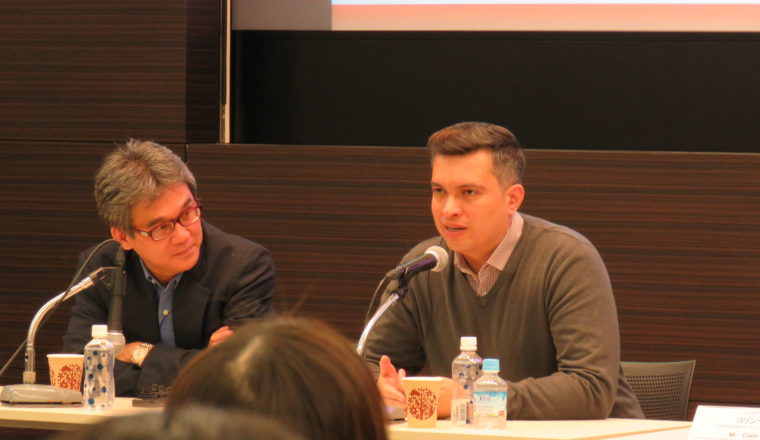
ご質問に対する答えに戻りますが、時には、自分でまずやってみることが大切だと思います。自分でその変化を生み出し、自分が思うような方向に変えていく必要があるのだと思います。その変化を待ち望んでいる人は沢山いると思います。そういった人が気づき、助けてくれ、支えてくれるのだと私は考えています。
In coming back to your questions, sometimes you need to do it by yourself. You need to make that change you want to see, and everyone who are waiting for the change will come in, support you and help you.
マルコ:私の経験も同じようなものです。政府にはいくつかの問題がありました。1つ目は私たちは誰も政府に芸術に助成する制度があることを知らなかったのです。2つめはルールが細かく厳しすぎたことです。そして3つ目はアーティストの政府の責任や政策、制度に対する理解不足でした。
Marco: My experience is quite similar. Indonesia government had 2-3 issues. One, overtime, we didn’t know about the government fund. Second, the rules were very difficult to comply. And finally, artists have to understand the government’s responsibility and accountability.
例えば、私たちがもっているジョグジャカルタの施設ですが、これも政府からの助成で作られました。当時の文化庁長官からの個人的な頼みごととでもいいましょうか、彼から芸術施設に関しての相談があったのです。私も似たようなことを考えており、アイデアがあると説明したところ、政府にもそういった芸術発展プログラムに助成する制度があるので申請書をだしてみたらどうかと言われました。ですから、申請書を書き助成をもらったというわけです。今まで政府の助成は沢山あったようですが、それを知っている小数のアーティストや団体に何年も何度も助成を繰り返していました。これに対して何も誰も変えなかったのです。
For example, our facility in Jog Jakarta was funded by the government. At that time, based on a personal inquiry to the minister of that time asking my advice for arts development programs. I had an idea as well, so the government told me, ‘we have a fund for that, why don’t you write a proposal?’ So I wrote it and got the fund. I didn’t know there was a fund within the government until they told me. The government had funded many people but only fund the same artists, and nobody has done anything about it.
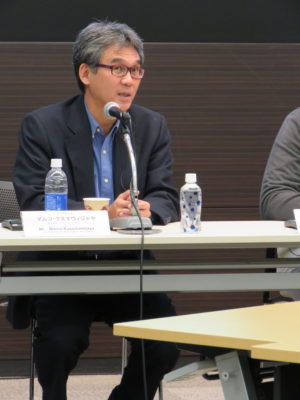
ですから、みなが私に「長官と話すことができるのでしょう、この制度を変えてくれませんか?」と聞いてきました。私だけではかえることができませんが、こういったつながりを通してかえることができるのです。自分が行動を起こしえ変えなくてはいけないと思います。もちろん、政府の制度や政策に反することや法律に反することをしない範囲でですが(笑)こういったことには誰かリーダーシップを取れる人間が間にはいり、政府とアーティストの架け橋にならなくてはいけないと考えています。こういったことで新しい変化が生まれるのではないでしょうか。
People said to me, ‘you are now talking with the minister, can we change it?’ I cannot change on my own, but through these connections, yes. You just need to change it as long as you don’t go against the law. It is important for leadership who will be willing to become a bridge between the government and artists, possibly to create new.
――沢山のアーティストが皆さんに集まってきていますよね。例えば、100~200人集まるようなしかけなどありますか?
Q: A lot of artists are gathering to you. For example, do you have any tricks or strategies in order to gather 100-200 ?
コリン:私たちがアートの分野に従事してから数十年という長い年月がたっているということもあります。特に、アーティストの利益になるように従事していたということもあるでしょう。シンガポールでは芸術は古いものではありません、新しいもので斬新なものとして考えられています。ライスカンパニーはシンガポールコミュニティの約30%とかかわりをもち、彼らが芸術に触れ、芸術に触れることで得られる財産を増やしていく努力を10年間続けてきました。シンガポールに住んでいる誰もが芸術に触れるよう努力をしてきました。
Colin: We have been in arts for long long time, working for benefits for the artists. In Singapore, arts are not old, rather new and vibrant. RICE focuses more than 30% of Singaporean communities, making sure they enjoy benefit of arts for last 10 years. No one go without arts.
しかし、問題もあります。雇用がないのです。誰もがアーティストになれます、しかし金銭の問題、雇用の問題を解決しなくてはいけません。ライスカンパニーは新しい助成制度のメカニズムを使い、企業に目を向けました。企業にとって芸術に投資するメリットはなにか、それによって得られる金銭的・非金銭的利益は何か、継続して芸術支援を行うためには、などこういったことを考えモデルをつくるのに2年かかりました。
Funding are all there. But another problem is where is employment? Everyone can be artists, but need to solve money problem. RICE uses a new funding mechanism how corporations can be useful for investment, to earn money, and continue to support arts. It took 2 years to put this model together.
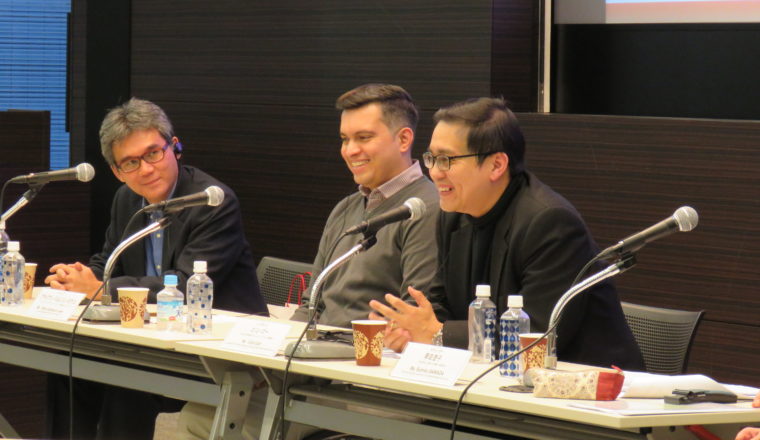
もし、芸術に対して真剣に考えているのであれば、政府や民間、寄付ばかりに頼っていてはいけないのです。スポンサーばかり頼ってはいけないのです。自分自身で金銭的収入を生み出すすべを身につけなくてはいけません。そうしなくては芸術コミュニティは発展しません。
If you are serious about arts, you cannot rely on only the government, donation and sponsor all the time. You need alternative, so that arts community would grow.
